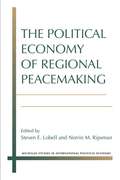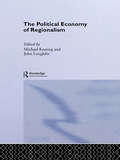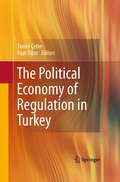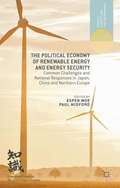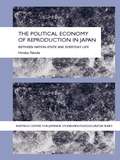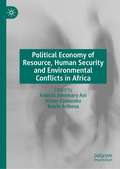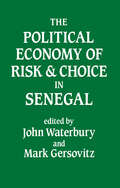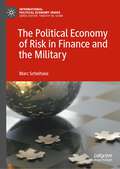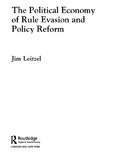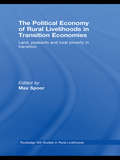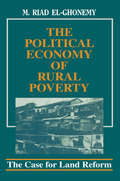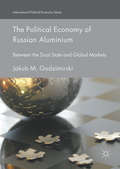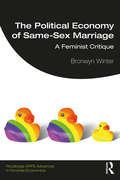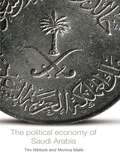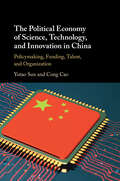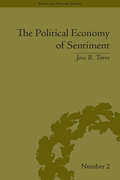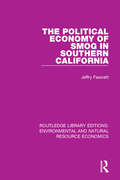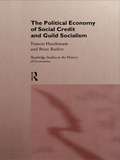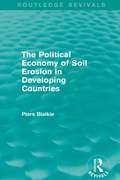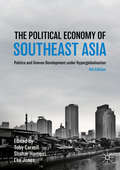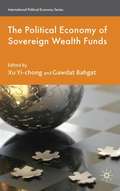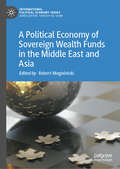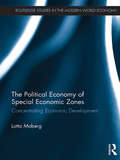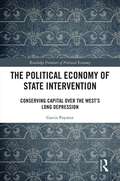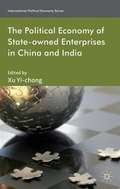- Table View
- List View
The Political Economy Of Regional Peacemaking
by Steven E. Lobell Norrin M. RipsmanIn this volume, scholars examine the efficacy of trade agreements, economic sanctions, and other strategies of economic statecraft for the promotion of peace both between rival states and across conflict-ridden regions more generally. In the introduction, Steven E. Lobell and Norrin M. Ripsman pose five central questions: (1) What types of economic statecraft, including incentives and sanctions, can interested parties employ? (2) Who are the appropriate targets in the rival states-state leaders, economic and social elites, or society as whole? (3) When should specific economic instruments be used to promote peace-prior to negotiations, during negotiations, after signature of the treaty, or during implementation of the treaty? (4) What are the limits and risks of economic statecraft and economic interdependence? (5) How can economic statecraft be used to move from a bilateral peace agreement to regional peace? The contributors consider the five key questions from a variety of methodological, historical, cultural, and empirical perspectives, drawing data from the Pacific, the Middle East, Europe, Asia, and Latin America. Book jacket.
The Political Economy of Regionalism (Routledge Studies in Federalism and Decentralization)
by Michael Keating John LoughlinExamining the effects of economic and political restructuring on regions in Europe and North America, the main themes here are: international economic restructuring; political realignments questions of territorial identity; and policy choices and policy conflicts in regional development.
The Political Economy of Regulation in Turkey
by Tamer Çetin Fuat OğuzThe Political Economy of Regulation in Turkey brings together leading international scholars and experts on Turkey and regulatory reform to provide essential information on the recent Turkish experience and its relation to competition policy. After the 1980 liberalization reform, Turkey tried to introduce competition in many industries, but network industries have remained as monopolies. At the end of the 1990s, regulatory reform was initiated and independent regulatory agencies have been established by the government. Comprehensive discussions of these network industries, in particular airlines, electricity, natural gas, telecommunications and environment regulations, are offered. The contributors inquire how economic theory and historical analyses can enlighten the character of market processes and the role for government action in these industries, and the contributions shed light on the very recent changes in the regulatory structure and important legal cases that shape the future of regulated industries. This book discusses these issues in an international perspective and relates the Turkish experience to other similar countries, such as in Eastern Europe and Central America. This book serves as a useful guide to those who want to understand major changes in Turkey and regulatory reforms in other emerging markets, making it of interest to researchers and PhD students concerned with regulatory economics, the Turkish economy, and economic policy in emerging markets.
The Political Economy Of Renewable Energy And Energy Security
by Espen Moe Paul MidfordBringing together renewable energy and energy security, this book covers both the politics and political economy of renewables and energy security and analyzes renewable technologies in diverse and highly topical countries: Japan, China and Northern Europe.
The Political Economy of Reproduction in Japan: Between Nation-state And Everyday Life (The University of Sheffield/Routledge Japanese Studies Series)
by Takeda HirokoThis book analyzes the political economy of reproduction and its role in the process of Japanese modernization. Hiroko analyzes state attempts and policies to intervene into women's bodies and everyday lives to integrate them into the Japanese political economy. Based on Foucault's concept of governmentality the author develops a model to assess reproduction in three forms - economic, biological and socio-political - from 1868 until the present day.
Political Economy of Resource, Human Security and Environmental Conflicts in Africa
by Kelechi Johnmary Ani Victor Ojakorotu Kelvin BribenaThis book shows the push and pull effects between resources, human security and conflicts in Africa. It recognizes the need for resources in Africa to be processed into finished goods in order to influence global market and redefine the pattern of trade relations with powerful countries of Asia, America and Europe in shaping the destiny and future of African countries. The achievement of this laudable objective is plagued by the security challenges which are directly or indirectly linked to resource-related conflicts rocking most of the resource endowed countries in the continent, thereby threatening global peace and security. To deal with this menace in the continent, it requires global co-operation and support of foreign governments, international organizations, international non-government organizations, governments of host countries and its citizens. The book presents the cases and experiences of countries that are endowed with resource, as well as have experienced different forms of human insecurity and have witnessed environmental conflicts in its analysis, which make the discourse interesting and quite educating.
The Political Economy of Risk and Choice in Senegal
by John WaterburyFirst Published in 1987. Routledge is an imprint of Taylor & Francis, an informa company.
The Political Economy of Risk in Finance and the Military (International Political Economy Series)
by Marc SchelhaseThis book is about risk conceptions, experiences and reflections. It applies the concept of the risk triangle, with its societal, organisational and personal angles, to two areas of inquiry: financial markets and the military, seeking to demonstrate the challenges, dilemmas and, in many ways, also the impossibilities of risk analysis and risk management. Drawing on empirical and micro- and macro-level analysis, this innovative work will appeal to students of political science, economics and business as well as to risk professionals and risk-takers.
The Political Economy of Rule Evasion and Policy Reform (Routledge Frontiers Of Political Economy Ser. #Vol. 45)
by Jim LeitzelThe Political Economy of Rule Evasion and Policy Reform develops the logic underlying the connections between breaking the rules and making the rules. Approaching policy issues from the point of view of rule circumvention provides a perspective that illuminates a wide variety of phenomena:* implicit tolerance of extensive illegal behaviour, treadmi
The Political Economy of Rural Livelihoods in Transition Economies: Land, Peasants and Rural Poverty in Transition (Routledge ISS Studies in Rural Livelihoods #Vol. 3)
by Max SpoorRural poverty is a phenomenon that is widespread yet often ignored by policy makers and researchers. This edited volume looks critically at rural poverty in Central Eastern Europe, Russia, the Caucasus and Central Asia, China and Vietnam in relation to land reform, farm restructuring and the development of rural markets and in the context of a large gap between rural and urban incomes and deteriorating rural social services and infrastructure. Although in most countries rural poverty has been decreasing in the past few years, economic growth in rural areas is slow, and rural incomes are not ‘catching up’ with the rapid overall growth rates of these transition economies. In general, the livelihoods of rural dwellers remain relatively poor. Next to comparative studies, the chapters in this book explore various aspects of agrarian reform, and analyze the interlocking or interlinking (land, input and output) markets that are crucial for rural development that have often remained weakly developed in transition economies, including case studies from Russia, Moldova, Uzbekistan, Armenia, Vietnam and China and a wealth of detailed analysis. These chapters reflect the striking differences between transition countries in their processes of rural reform and development of rural poverty. These differences are generally dependent on the initial conditions at the eve of transition, the policies implemented, the sequencing of reforms, and the importance that was given to the sector in the overall development strategy, such as can be seen if the Asian transition economies (ATEs) are compared with many of those in Eastern Europe.
The Political Economy of Rural Poverty: The Case for Land Reform
by M. Riad El-GhonemyWith the use of wide-ranging case studies the author clearly illustrates the impact of schemes intended to re-allocate land in developing countries. Concluding that land reform can play a major part in stimulating rural economies this book explores the extent to which such policies can successfully reduce poverty and increase agricultural growth.
The Political Economy of Russian Aluminium
by Jakub M. GodzimirskiThis book addresses how the progress of the Russian aluminium industry, which has developed into an important global actor, has been influenced by the interaction of global market forces and the evolution of the Russian political system. After the collapse of the Soviet Union, Russian aluminium producers needed to adapt to changing framework conditions, both with regards to the global aluminium market and in Russia. Examining the most important changes in the organization of the global aluminium trade - the reorganization and consolidation of Russian aluminium industry and its 'oligarchization' - Godzimirski charts the evolution of the relationship between political and economic power in Russia, and the impact that this development has had on survival and adaptation strategies of key aluminium players in the country.
The Political Economy of Same-Sex Marriage: A Feminist Critique (Routledge IAFFE Advances in Feminist Economics)
by Bronwyn WinterSame-sex marriage is now legal in twenty-nine countries and the subject of continued debate around the world. The Political Economy of Same-Sex Marriage: A Feminist Critique considers this debate from a political economy perspective. Rather than engaging directly in the now well-rehearsed social-movement and academic for-and-against debates, this book focuses on processes of institutionalization of same-sex marriage and so-called "rainbow families" within (neo)liberal capitalist democracies. It examines how states and markets appropriate same-sex marriage and family to enhance their own political and symbolic capital, consolidating power and profit within existing systems of gendered and raced socioeconomic stratification. Taking a radical feminist, heterodox, qualitative and intersectional approach, this book investigates the political economy of same-sex marriage across three axes: same-sex marriage as institution; same-sex marriage and the market; and the political economy of the "rainbow family". The examination of case studies from different countries and regions enables a comparative analysis that foregrounds cultural, political and economic path dependencies while at the same time highlighting a number of striking commonalities. In all the countries discussed in this book and in most respects, same-sex marriage has been integrated almost seamlessly into a mainstream/malestream political economy of marriage and family and its translation into added market and productive value. The Political Economy of Same-Sex Marriage: A Feminist Critique will be of use to researchers and students alike, and indeed to all those who are curious about the mainstreaming of homosexuality within twenty-first-century capitalist democracies.
The Political Economy of Saudi Arabia
by Tim Niblock Monica MalikWith Saudi Arabia being of immense importance both politically and economically in the Middle East, this book provides a much needed, broad ranging survey of the development of the Saudi economy from the 1960s to the present day. Written by a highly reputable author, the book includes an analysis of how political and social factors have shaped policy, and how the Saudi state is coping with the dynamics of a rapidly changing economic and political situation.
The Political Economy of Science, Technology, and Innovation in China: Policymaking, Funding, Talent, and Organization
by Yutao Sun Cong CaoThere are a variety of reasons underlying the remarkable development of science and technology (S&T), and innovation in post-1978 China. This book seeks to achieve an understanding of such development from an institutional or a political economy perspective. Departing from the literature of S&T and innovation studies that treats innovation as a market or enterprise's behavior in Schumpeter's sense, Sun and Cao argue that it involves politics, institutions, and the role of the state. In particular, they examine how the Chinese state has played its visible role in making innovation policies, allocating funding for R&D programs, making efforts to attract talent, and organizing critical S&T programs. This book appeals to scholars in S&T and innovation policy, political economy, innovation governance, and China studies as well as policymakers and business executives.
The Political Economy of Sentiment: Paper Credit and the Scottish Enlightenment in Early Republic Boston, 1780-1820 (Financial History #2)
by Jose R TorreSituates changes in the nature of money and the rise of sophisticated financial structures at the centre of the Enlightenment. This work argues that paper credit instruments were causal - critical to the larger epistemological and psychological changes associated with the Enlightenment's reconstruction of value.
The Political Economy of Smog in Southern California (Routledge Library Editions: Environmental and Natural Resource Economics)
by Jeffry FawcettThis study, first published in 1990, explores the ways in which institutions can succeed or fail at environmental improvement. The author first takes a look at the nature of environmental politics and the history of air pollution control in Southern California. He then develops a political economic model that asks the question: what effect have the dramatic changes that have occurred throughout the history of air pollution control in Southern California had on air quality? Jeffry Fawcett uses the information gathered to both evaluate the relationship between air quality and institutional change; and to evaluate how political economists explain how state environmental institutions work. This title will be of interest to students of environmental economics and policy.
The Political Economy of Social Credit and Guild Socialism (Routledge Studies in the History of Economics #Vol. 14)
by Brian Burkitt Frances HutchinsonThis work approaches the phenomenon of guild socialism from a new perspective, focusing on the Douglas Social Credit movement. It explores the key ideas, gives an overview of the main theories and traces their subsequent history. Thoroughly researched, it provides original material relevant to the field of political economy. This early approach to non-equilibrium economics reveals the extent of the incompatibility between capitalist growth economics and social and environmental sustainability.
The Political Economy of Soil Erosion in Developing Countries
by Piers BlaikieFirst published in 1985. This book examines wide variety of ways in which environmental deterioration, in particular soil erosion, can be viewed and the implicit political judgements that often inform them. Using the context of developing countries, where the effects tend to be more acute due to underdevelopment and climatic factors, this work aims to examine this source of uncertainty and make explicit the underlying assumptions in the debate about soil erosion. It also rejects the notion that soil erosion is a politically neutral issue and argues that conservation requires fundamental social change. This title will be of interest to students of environmental and developmental studies.
The Political Economy of Southeast Asia: Politics and Uneven Development under Hyperglobalisation (Studies in the Political Economy of Public Policy)
by Shahar Hameiri Lee Jones Toby Carroll"This is not only the best collection of essays on the political economy of Southeast Asia, but also, as a singular achievement of the “Murdoch School”, one of the rarest of books that demonstrates how knowledge production travels across generations, institutions and time periods, thereby continually enriching itself. No course on Southeast Asia can afford to miss it as its core text." (Professor Amitav Acharya, American University, USA) "This book – the fourth in a path-breaking series – demonstrates why a critical political economy approach is more crucial than ever for understanding Southeast Asia's transformation. Across a wide range of topics, the book explains how capitalist development and globalisation are reshaping the societies, economies and politics of a diverse group of countries, casting light on the deep sources of economic and social power in the region. This is a book that every student of Southeast Asia needs to read." (Professor Edward Aspinall, Australian National University, Australia) "This book does what a work on political economy should do: challenge existing paradigms in order to gain a deeper understanding of the processes of social transformation. This volume is distinctive in three ways. First, it eschews methodological nationalism and focuses on how the interaction of national, regional, and global forces are shaping and reshaping systems of governance, mass politics, economies, labor-capital relations, migration, and gender relations across the region. Second, it is a bold effort to show how the “Murdoch School,” which focuses on the dynamic synergy of internal class relations and global capitalism, provides a better explanatory framework for understanding social change in Southeast Asia than the rival “developmental state” and “historical institutionalist” approaches. Third, alongside established luminaries in the field, it showcases the younger generation of political economists doing pathbreaking work on different dimensions of the political economy of the region." (Walden Bello, State University of New York at Binghamton, USA, and Former Member of the Philippines’ House of Representatives) "This very timely fourth edition explores Southeast Asia’s political economy within the context of hyperglobalisation and China’s pronounced social-structural impacts on international politics, finance and economics over the past decade and a half. The volume successfully adopts a cross-cutting thematic approach, while also conveying the diversity and divergences among the Southeast Asian states and economies. This will be an important resource for scholars of International Relations and Comparative Politics, who need to take an interest in a dynamic and increasingly significant part of Asia." (Professor Evelyn Goh, Australian National University, Australia) “This ambitious collection takes a consistent theoretical approach and applies it to a thematic, comparative analysis across Southeast Asia. The yield is impressive: the social, political and economic forces constituting the current conjuncture are not simply invoked, they are thoroughly identified and explained. By posing the deceptively simple questions of what is happening and why, the authors demonstrate the reciprocal relation between theory-building and empirical inquiry, providing a model of engaged scholarship with global resonance. Bravo!" (Professor Tania Li, University of Toronto, Canada) "Counteracting the spaceless and flattened geography of much literature on uneven development, this book delivers a forensic examination of the unevenness of geographical development in Southeast Asia and the relations of force shaping capital, state, nature and civil society. This is the most compelling theoretical and empirical political economy book available on Southeast Asia." (Professor Adam David Morton, University of Sydney, Australia) "A vital book for all scholars, students and practitioners concerned with political economy and development, this volume combines cutting-edge theory with
The Political Economy of Sovereign Wealth Funds
by Xu Yi-Chong Gawdat BahgatThis book examines the origin, nature, the portfolio, organizational structure and operation of the seven largest SWFs from the perspective of the holding countries. Uniquely it tackles the issues from the perspectives of those non-OECD countries whose access to funds creates the most concern.
A Political Economy of Sovereign Wealth Funds in the Middle East and Asia (International Political Economy Series)
by Robert MogielnickiThis book on sovereign wealth funds (SWFs) in the Middle East and Asia brings together leading scholars and practitioners focusing on investment trends in two prominent and influential regions of the globe. The resulting political economy mapping of these investment vehicles breaks new ground in elucidating prominent geographic contours of the global SWF sector. The interregional framing likewise reveals the strategic economic significance of SWF-facilitated linkages between the Middle East and Asia. The work probes three cross-cutting themes. The initial chapters explore the dynamics of competition and collaboration amongst Middle Eastern and Asian SWFs. This book then turns to the energy, environmental, and sustainability issues shaping SWF investment behavior. Finally, country-specific chapters examine how and why SWF investments materialize within key markets. These interregional connections enabled by sovereign wealth represent an expanding economic frontier with long-term implications for the Middle East, Asia, and the global economy.
The Political Economy of Special Economic Zones: Concentrating Economic Development (Routledge Studies in the Modern World Economy)
by Lotta MobergSpecial Economic Zones (SEZs) have become a popular development policy throughout the world over the last half a century. These zones form designated areas where governments offer businesses lower taxes, tariffs, and often lighter regulations. Generally, SEZs aim to attract investments and raise a country’s export and employment rates, but although success stories are often cited, there are numerous failed projects that have instead become burdens for their host countries. This book examines SEZs from a political economy perspective, both to dissect the incentives of governments, zone developers, and exporters, and to uncover both the hidden costs and untapped potential of zone policies. Costs include misallocated resources, the encouragement of rent-seeking, and distraction of policy-makers from more effective reforms. However, the zones also have several unappreciated benefits. They can change the politics of a country, by generating a transition from a system of rent-seeking to one of liberalized open markets. In revealing the hidden promise of SEZs, this book shows how the SEZ model of development can succeed in the future. Applying frameworks from various schools of political economy, this volume places SEZs in the context of their mixed past and promising future. It is essential reading for anyone with an interest in international economics, development economics, and political economy, including practitioners and consultants of SEZ policies.
The Political Economy of State Intervention: Conserving Capital over the West’s Long Depression (Routledge Frontiers of Political Economy)
by Gavin PoynterBoth the exponents and critics of neoliberalism assert the dominance of market forces in western nations. The Political Economy of State Intervention calls this into question. Through a re-examination of state intervention in the USA and Britain over the course of the "long depression" (1970-to date), this book argues that the state has performed an increasingly significant role in conserving capital, propping up an economic and social order that has lost its productive dynamism. The specific forms of capital’s dependency on the state may vary, however the underlying weaknesses of mature western economies have prompted new forms of state intervention narrowly aimed at conserving capital, especially in the wake of the financial crisis. The chapters consider factors which are usually posited as explanations for the long depression such as oil price shocks, domestic conditions and technological innovation. The work argues that the consensus view of neoliberalism has served to underplay the significance of the state’s role in failing to lift this long depression in several ways: it has lent a greater ideological coherence to the policies pursued by successive governments than they deserve; the state has been less subordinate to the market than is usually claimed and more often its maker; and there has been a significant growth in jobs located in the private sector that are funded by public money. The cumulative effect of this is a narrowing of the state’s purpose to conserving capital, a role which has contributed to its loss of authority as an institution that claims to represent society as a whole. It is theorised that this, in turn, has led to the insecurities of the existing political order and the rise of populism. This book will be of great interest to students and scholars of political economy, public policy, political theory, economics and sociology.
The Political Economy of State-owned Enterprises in China and India
by Xu Yi-ChongFocused on unique features of economic development, this edited volume examines the nature and structure of corporate governance of several key state-owned enterprises in China and public sector units in India in five strategic sectors: oil and natural gas, steel, coal, electricity generation, and banking industries.
